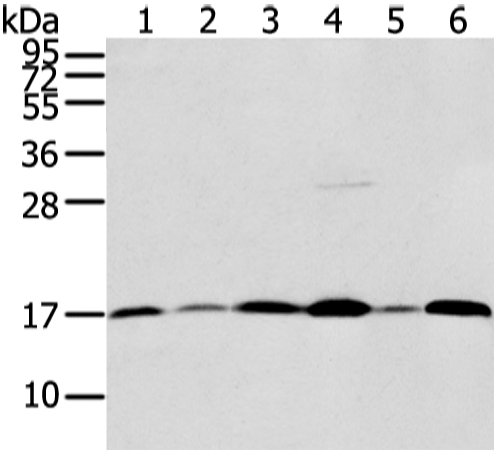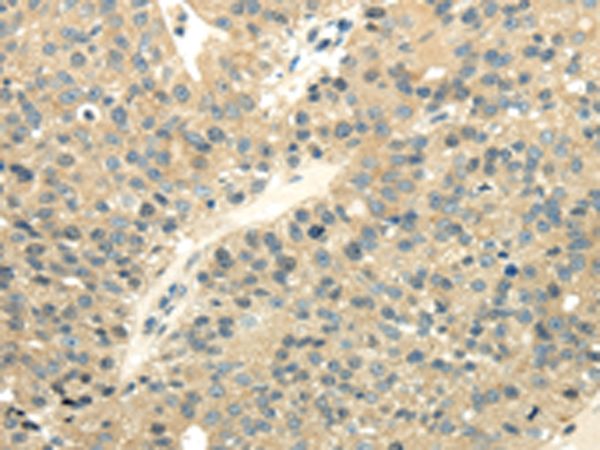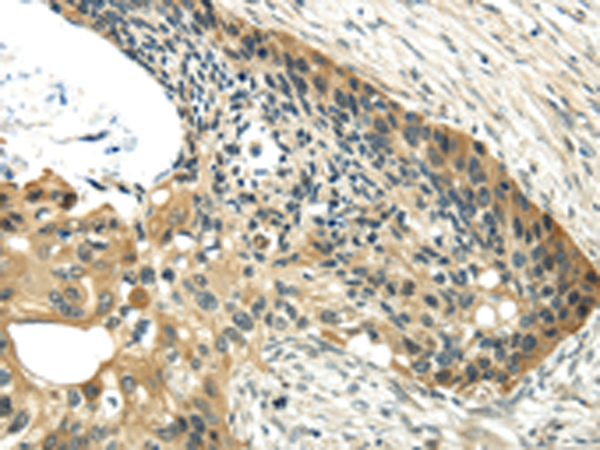


| WB | 1/1000-1/5000 | Human,Mouse,Rat |
| IF | 咨询技术 | Human,Mouse,Rat |
| IHC | 1/30-1/150 | Human,Mouse,Rat |
| ICC | 技术咨询 | Human,Mouse,Rat |
| FCM | 咨询技术 | Human,Mouse,Rat |
| Elisa | 1/2000-1/10000 | Human,Mouse,Rat |
| Aliases | GDX; G6PD; GET5; MDY2; UBL4; TMA24; DX254E; DXS254E |
| WB Predicted band size | 18 kDa |
| Host/Isotype | Rabbit IgG |
| Antibody Type | Primary antibody |
| Storage | Store at 4°C short term. Aliquot and store at -20°C long term. Avoid freeze/thaw cycles. |
| Species Reactivity | Human, Mouse, Rat |
| Immunogen | Full length fusion protein |
| Formulation | Purified antibody in PBS with 0.05% sodium azide and 50% glycerol. |
+ +
以下是关于UBL4A抗体的3篇参考文献概览,包含研究重点及抗体应用场景:
---
1. **文献名称**:*UBL4A is essential for endoplasmic reticulum-associated protein degradation (ERAD) through facilitating the recruitment of ubiquitylated substrates*
**作者**:Zhang Y, et al. (2018)
**摘要**:研究揭示了UBL4A在ERAD通路中的关键作用,通过特异性抗体进行免疫共沉淀(Co-IP)和荧光定位实验,证明UBL4A协助识别并转运泛素化底物至蛋白酶体降解。
2. **文献名称**:*UBL4A interacts with autophagy receptors to modulate selective mitophagy in response to mitochondrial stress*
**作者**:Lee S, et al. (2020)
**摘要**:利用UBL4A抗体进行Western blot和免疫荧光分析,发现UBL4A通过与自噬受体(如p62)相互作用,调控线粒体应激下的选择性线粒体自噬过程。
3. **文献名称**:*UBL4A suppresses tumor metastasis by stabilizing the epithelial-mesenchymal transition (EMT) suppressor ZEB1*
**作者**:Chen X, et al. (2019)
**摘要**:通过免疫组化(IHC)和ChIP实验(使用UBL4A抗体),证实UBL4A通过维持ZEB1蛋白稳定性抑制EMT进程,从而阻碍癌症转移。
---
**说明**:以上研究均涉及UBL4A抗体的实验应用(如Western blot、免疫荧光、免疫组化等),聚焦于UBL4A在蛋白质降解、细胞自噬及癌症中的功能机制。如需具体文献DOI或补充更多研究,可进一步扩展检索范围。
The UBL4A (Ubiquitin-like protein 4A) antibody is a research tool used to detect and study the UBL4A protein, a member of the ubiquitin-like protein family. UBL4A, also known as Get5 or MDY2. plays a role in cellular protein quality control, particularly in the tail-anchored (TA) protein biogenesis pathway. It forms part of the BAG6 complex, which assists in the proper targeting of TA proteins to the endoplasmic reticulum (ER) and participates in the degradation of mislocalized polypeptides via the ubiquitin-proteasome system. UBL4A is implicated in ER-associated degradation (ERAD), stress response, and maintaining cellular homeostasis.
Antibodies against UBL4A are essential for investigating its expression, localization, and interactions in various biological contexts. They are widely used in techniques like Western blotting, immunofluorescence, and co-immunoprecipitation to explore its regulatory mechanisms. Studies have linked UBL4A dysfunction to diseases such as cancer and neurodegenerative disorders, highlighting its potential as a therapeutic target. For example, altered UBL4A expression has been observed in certain tumors, influencing apoptosis and metastasis. Researchers also utilize these antibodies to dissect its role in immune responses, as UBL4A may modulate NF-κB signaling. Commercial UBL4A antibodies are typically validated for specificity across human, mouse, and rat samples, enabling cross-species studies. Ongoing research continues to uncover its multifaceted roles in cellular physiology and pathology.
×